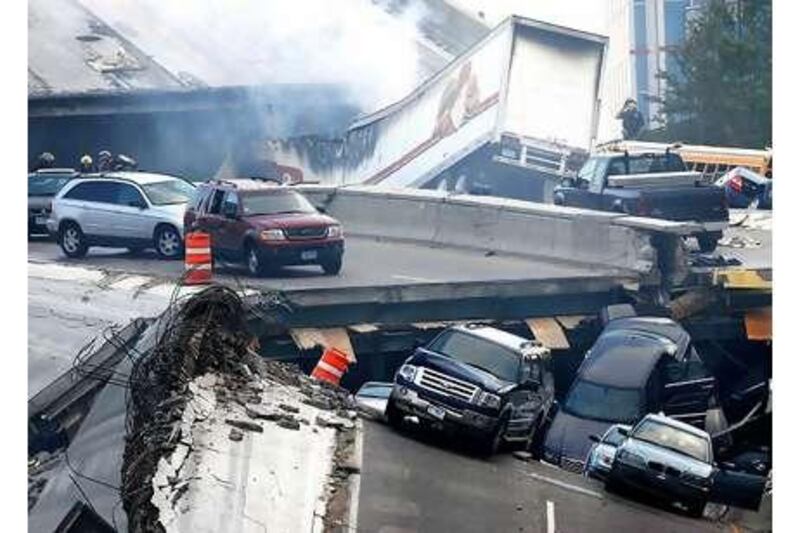This may seem like the wrong time to ask American taxpayers to bail out another ailing sector of the US economy, given Washington's recent guarantee of the nation's two largest mortgage lenders, along with a massive home loan bailout. But there's room for an expanded federal government role in the repair of America's battered infrastructure, and it may be the last best hope for the nation's economic future.
Rebuilding roads, ports and sewage systems is not the kind of hot-button issue that candidates in a presidential campaign are likely to embrace. But the Democratic contender, Barak Obama, has done just that, backing a bipartisan bill for the creation of a national infrastructure bank (unlike his Republican rival, John McCain). As laid out by its architects - the Republican senator, Chuck Hagel, and his Democratic counterpart, Christopher Dodd - the bank would reduce federal funding of infrastructure development while making the process more efficient and less corrupt. The idea is long overdue. America's economic arteries, sinews and internal organs are in a state of advanced decay. The collapse of New Orleans's levees after hurricane Katrina three years ago was only the most dramatic example of the consequences of neglect.
The American Society of Civil Engineers gives the country's infrastructure a "D" on its annual report card, with failing or poor grades for drinking water systems and navigable waterways, roads and rail grids, and air traffic networks. The Congressional Budget Office estimates that Americans spend 20 per cent below what is needed just to sustain critical infrastructure. As if to punctuate the urgency of the crisis, an eight-lane bridge in Minnesota collapsed, killing 13 people and injuring hundreds, within hours after Messrs Hagel and Dodd announced their bill last August at a thinly attended press conference.
The deterioration of America's economic viscera comes as its presumed rival, China, is well into the world's most ambitious infrastructure development programme since the 19th century. Beginning nearly from scratch, China now has a world-class port system thanks to a US$7 billion (Dh25.7bn) overhaul and the help of Dubai Ports World, which the US congress in an adolescent, nativist fit, barred from its home market in early 2006.
China is slated to spend nearly $200bn on rail transport from 2006 to 2010, and in the past 15 years has laid a motorway grid that is nearly as large as America's. So how did a country that pioneered the transcontinental railway, a national telegraph system, the I-beam and vertical urbanisation, the light bulb, cell phone technology and interstate road travel manage to fail the grade on infrastructure?
Blame state governments, which habitually divert federal funds for public works to unrelated projects and programmes. Federal monies can be skimmed on behalf of pet projects or to sustain underfunded services like education and health. According to a report from the Government Accountability Office, federal funding of national infrastructure projects has become a "cash transfer, general purpose grant programme" abetted by national laws that ensures the state's prerogative to spend federal money however it sees fit.
The Hagel-Dodd bill would starve and eventually replace this ad hoc process with a bank that would appraise the nation's infrastructure needs nationally and strategically. Its staff would evaluate every project proposal, as a loan officer would a business plan. Appraisers would decide whether Washington should support worthy projects with a bond issue, a loan guarantee or an equity stake, and financing would come mostly from the private sector.
The bank's initial capital of $60bn would be drawn from general revenues - Washington spends about $75bn annually on public works - and its mandate to issue 30-to-50-year bonds could leverage that amount to an estimated $250bn within five years, according to the bill's sponsors. Implicit in the de facto privatisation of infrastructure and the transfer of funding obligations from the federal to the local level is a heavier financial burden on users.
While taxation of any kind has become an apostasy under President George W Bush's faith-based presidency, a plurality of politicians is slowly coming to grips with the long-term costs of doing nothing, as well as the political dividends of new investment. The Brookings Institution, a Washington DC-based think tank, estimates that upgrading US sea ports alone could increase the nation's exports by $10bn a year and support 60,000 jobs.
History shows that Americans will tolerate higher taxes if they get something in return. Dwight Eisenhower did it with the interstate motorway system and Franklin Roosevelt did it with rural electrification before him. If Mr Bush is so keen on securing a legacy in his remaining months in office, he should stop looking for one abroad and start building one - literally - at home. @Email:sglain@thenational.ae






